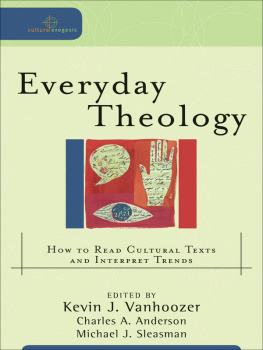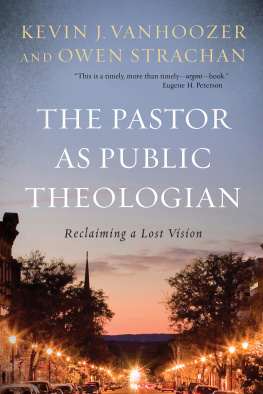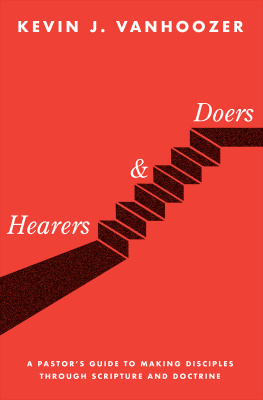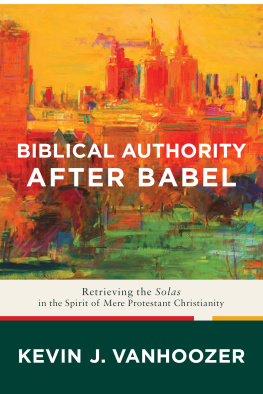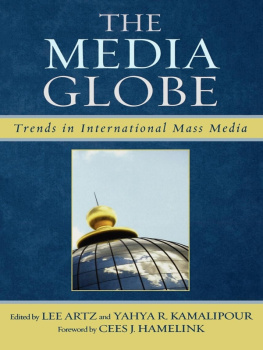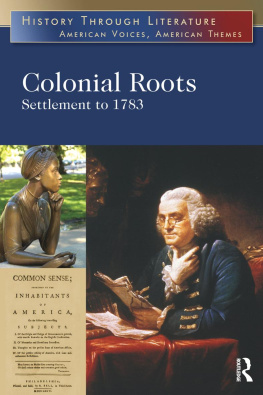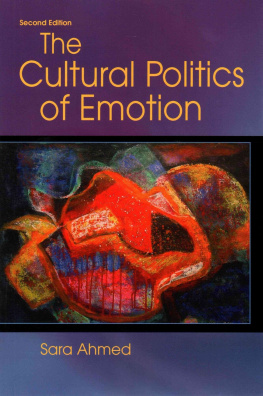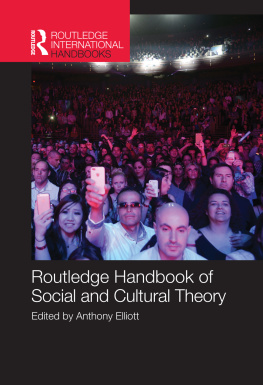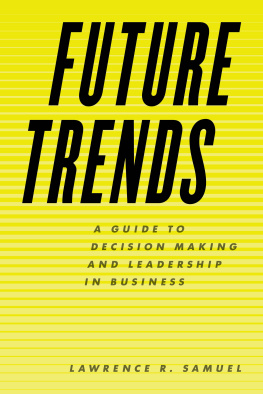Kevin J. Vanhoozer - Everyday Theology: How to Read Cultural Texts and Interpret Trends
Here you can read online Kevin J. Vanhoozer - Everyday Theology: How to Read Cultural Texts and Interpret Trends full text of the book (entire story) in english for free. Download pdf and epub, get meaning, cover and reviews about this ebook. year: 2007, publisher: Baker Publishing Group, genre: Religion. Description of the work, (preface) as well as reviews are available. Best literature library LitArk.com created for fans of good reading and offers a wide selection of genres:
Romance novel
Science fiction
Adventure
Detective
Science
History
Home and family
Prose
Art
Politics
Computer
Non-fiction
Religion
Business
Children
Humor
Choose a favorite category and find really read worthwhile books. Enjoy immersion in the world of imagination, feel the emotions of the characters or learn something new for yourself, make an fascinating discovery.
- Book:Everyday Theology: How to Read Cultural Texts and Interpret Trends
- Author:
- Publisher:Baker Publishing Group
- Genre:
- Year:2007
- Rating:4 / 5
- Favourites:Add to favourites
- Your mark:
- 80
- 1
- 2
- 3
- 4
- 5
Everyday Theology: How to Read Cultural Texts and Interpret Trends: summary, description and annotation
We offer to read an annotation, description, summary or preface (depends on what the author of the book "Everyday Theology: How to Read Cultural Texts and Interpret Trends" wrote himself). If you haven't found the necessary information about the book — write in the comments, we will try to find it.
Everyday Theology: How to Read Cultural Texts and Interpret Trends — read online for free the complete book (whole text) full work
Below is the text of the book, divided by pages. System saving the place of the last page read, allows you to conveniently read the book "Everyday Theology: How to Read Cultural Texts and Interpret Trends" online for free, without having to search again every time where you left off. Put a bookmark, and you can go to the page where you finished reading at any time.
Font size:
Interval:
Bookmark:
Everyday Theology
cultural exegesis
William A. Dyrness
and Robert K. Johnston, series editors
The Cultural Exegesis series is designed to complement the Engaging Culture series by providing methodological and foundational studies that address the way to engage culture theologically. Each volume works within a specific cultural discipline, illustrating and embodying the theory behind cultural engagement. By providing the appropriate tools, these books equip the reader to engage and interpret the surrounding cultural responsibly.
Everyday Theology
How to Read Cultural Texts and Interpret Trends
Edited by
Kevin J. Vanhoozer
Charles A. Anderson
Michael J. Sleasman

2007 by Kevin J. Vanhoozer, Charles A. Anderson, and Michael J. Sleasman
Published by Baker Academic
a division of Baker Publishing Group
P.O. Box 6287, Grand Rapids, MI 49516-6287
www.bakeracademic.com
Ebook edition created 2010
Ebook corrections 11.30.2011
All rights reserved. No part of this publication may be reproduced, stored in a retrieval system, or transmitted in any form or by any meansfor example, electronic, photocopy, recording without the prior written permission of the publisher. The only exception is brief quotations in printed reviews.
ISBN 978-1-4412-0049-5
Library of Congress Cataloging-in-Publication Data is on file at the Library of Congress, Washington, DC.
Unless otherwise indicated, Scripture quotations are from the HOLY BIBLE, NEW INTERNATIONAL VERSION. NIV. Copyright 1973, 1978, 1984 by International Bible Society. Used by permission of Zondervan. All rights reserved. www.zondervan.com
Scripture quotations marked RSV are from the Revised Standard Version of the Bible, copyright 1952 [2nd edition, 1971] by the Division of Christian Education of the National Council of the Churches of Christ in the United States of America. Used by permission. All rights reserved.
Scripture quotations marked ESV are from The Holy Bible, English Standard Version, copyright 2001 by Crossway Bibles, a division of Good News Publishers. Used by permission. All rights reserved.
Contents
Kevin J. Vanhoozer
Jeremy D. Lawson, Michael J. Sleasman, and Charles A. Anderson Jeremy
Darren Sarisky
David G. Thompson
Premkumar D. Williams
Michael J. Sleasman
Charles A. Anderson
Justin A. Bailey
Matthew Eppinette
Ben Peays
Charles A. Anderson and Michael J. Sleasman
Kevin J. Vanhoozer
A Readers Guide
How to Use This Book
This is a book about everyday theology, written by everyday theologians for everyday theologians.
Everyday theology is the reflective and practical task of living each day as faithful disciples of Jesus Christ. Theology is not for Sundays only. Disciples must walk the Christian way the whole weekend and throughout the workweek. Theology is an everyday affair: to live to the glory of God is a full-time privilege and pursuit. Everyday theology is the mandate of every Christian who is actively trying to walk the way of truth and life.
Theology serves the church by directing the people of God in ways of speaking and acting that embody the love of God, the reconciliation won by Jesus Christ, and the fellowship of the Holy Spirit. Theology not only articulates beliefs but suggests designs for living. Precisely what form our life together takes, however, depends on where (and when) we are: the house churches in first-century Palestine are a far cry from medieval monasteries or modern megachurches. The gospel gets worked out somewhat differently in diverse cultural settings. The gospelthe power of God unto salvationcan transform culture; culture, however, is only too happy to return the compliment. Everyday Christians have to learn to negotiate their way carefully, following the one way of Jesus Christ through a variety of cultural byways.
The purpose of this book is to teach Christians to get the theological lay of the cultural land. It is less a matter of spying out some new land than of becoming conscious of the land in which one already dwells. What the apostle Paul says to the Athenians about God is also true of culture: In [it] we live and move and have our being (Acts 17:28). Faithful disciples need to understand the biblical text, but they also need to understand their cultural context; they need to become bilingual.
If theology is the ministry of the Word to the world, it follows that theologians must know something about the world to which they are ministering. What should have been common sense, however, has for various reasons been something of a blind spot, at least until the advent of postmodernity. Indeed, one way of viewing postmodernity is as a turn to culture. Postmoderns have criticized modern myths about universality precisely because postmoderns have a keen sense of our situatedness in race, gender, class, history, traditionand culture.
Christian missionaries have always been aware of the need to engage culture. Yet only recently has it been suggested that the West has become a mission field. Lesslie Newbigin points out that the West presents a special challenge to Christian missions, for this is the first time the church has had to mount a mission to a culture that was previously Christian. How does one evangelize cultures that have already received the gospel only to revise or to reject it? For these and other reasons, Christian colleges and seminaries are increasingly coming to see that the study of culture is part and parcel of the prospective ministers theological training.
Where This Book Began
The genesis of this book lies in a course that I first taught in 2001 and have taught annually since then at Trinity Evangelical Divinity School: Cultural Hermeneutics (my two co-editors were student guinea pigs in that original class). The name of the course is significant. Most seminary students are well acquainted with biblical hermeneutics: the study of the principles and methods for interpreting the Bible. Similarly, cultural hermeneutics is the study of principles and methods for interpreting culture.
Devising the nameand of course the aims and objectivesof the course was the easy part. I quickly discovered that the plethora of textbooks in biblical hermeneutics stood in stark contrast to what I was able to find for my new course. While there were books in specific disciplines (e.g., anthropology, sociology) that dealt with interpreting culture, there were no textbooks that dealt with how to interpret culture theologically. I therefore have devised my own approach, a distillation of which may be found in the first essay of the present book. I also developed a number of case studies of cultural phenomenaranging from body piercing and gardens to John Fords film Stagecoach and Levis adsthat served as catalysts to my students imaginations.
The chapters that comprise this book were originally submitted as term papers for my course. My co-editors and I have selected a representative sampling from the one hundred and forty-five term papers written over the past five years. Other papers deserve to be included here but could not be due to considerations of space, balance, and so forth. Honorable mention goes to those students (you know who you are) who wrote on such diverse trends as makeovers, Starbucks (a very popular topic), masculinity, femininity, magazines for teenage girls, free-market dating, Internet dating, professional football, Notre Dame football (a world unto itself), extreme sports, bumper stickers, cell phones, lifestyle centers, worship styles, procrastination, facebook.com, Slam poetry, rap, hip-hop, literary genres (e.g., cyberpunk), radio shows (e.g.,
Next pageFont size:
Interval:
Bookmark:
Similar books «Everyday Theology: How to Read Cultural Texts and Interpret Trends»
Look at similar books to Everyday Theology: How to Read Cultural Texts and Interpret Trends. We have selected literature similar in name and meaning in the hope of providing readers with more options to find new, interesting, not yet read works.
Discussion, reviews of the book Everyday Theology: How to Read Cultural Texts and Interpret Trends and just readers' own opinions. Leave your comments, write what you think about the work, its meaning or the main characters. Specify what exactly you liked and what you didn't like, and why you think so.

